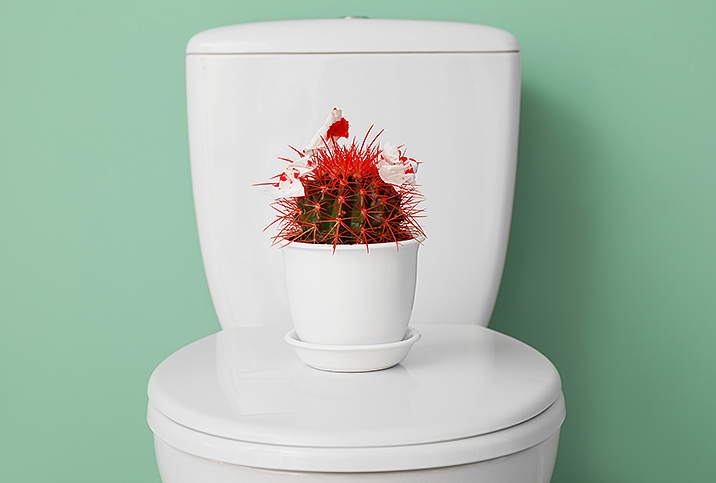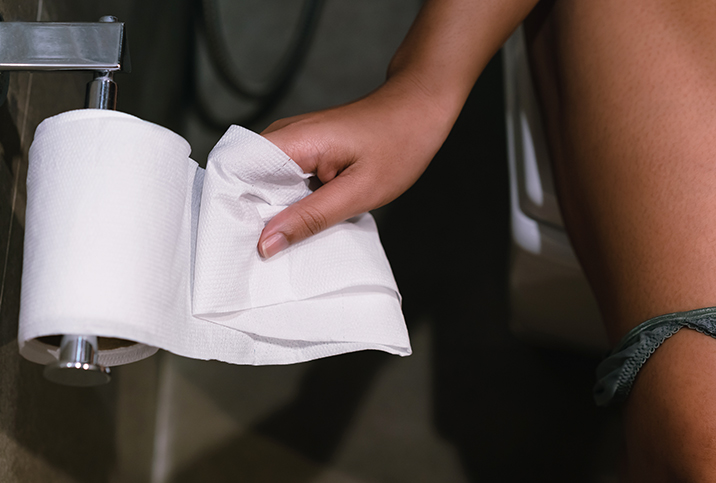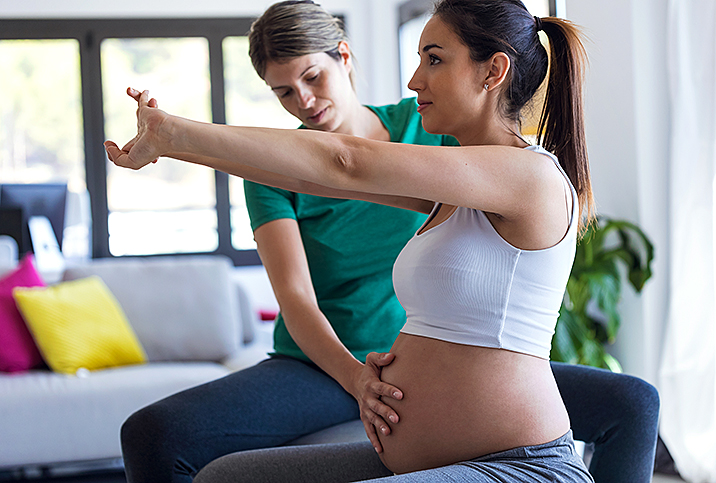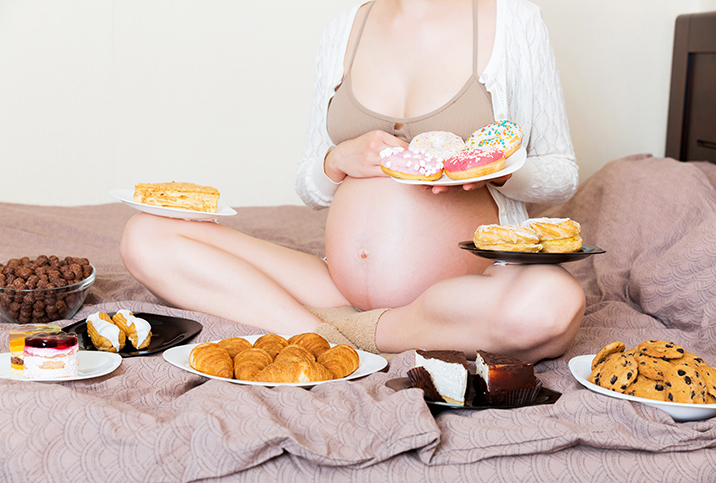What to Do When You're Constipated During Pregnancy
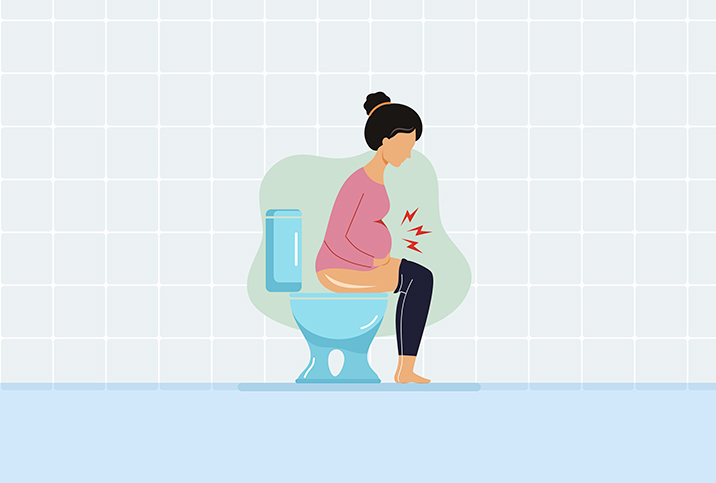
Changes in bowel habits are common during pregnancy. Perhaps you're relieved to know you're not the only one who has this discomfort, but struggling to defecate is not a pleasant experience. Just because it's common doesn't make it comfortable, especially when you add other typical pregnancy symptoms.
Constipation affects up to one-fourth of women during pregnancy, according to a 2007 study in Obstetrics & Gynecology journal. Symptoms can even remain up to three months after childbirth, the study indicated.
Bowel function is different from person to person, however, constipation is considered fewer than three bowel movements per week, said Tamara De Zotti, a trauma-informed certified birth doula and nutritional advisor based in Oslo, Norway.
Other symptoms may include:
- Straining at bowel movements
- Lumpy or hard stools
- Sensation of anorectal obstruction
- Sensation of incomplete evacuation
- Manual maneuvers to facilitate defecation
Causes behind constipation during pregnancy
Constipation during pregnancy mainly happens for a couple of reasons: the effects of progesterone in the digestive system and the pressure generated as the uterus grows, said Carlos Szajnert, M.D., an OB-GYN in Miami.
The effects of progesterone
"Gut motility decreases during pregnancy due to hormonal influences," said Kecia Gaither, M.D., who is board-certified in OB-GYN and maternal-fetal medicine and the director of perinatal services/maternal-fetal medicine at NYC Health + Hospitals/Lincoln in the Bronx in New York City.
"Progesterone is one of the hormones that is elevated during pregnancy, and its effect in the digestive system is that it makes it slower," Szajnert said.
During pregnancy, this slowdown in the movement of the digestive system is caused by the relaxation of the intestinal muscle due to increased progesterone, according to De Zotti.
The effect of uterine pressure
"As the uterus grows, especially in the third trimester, [it] increases the abdominal pressure and mechanically compresses the bowels, making it more difficult for normal digestion to take place," Szajnert explained.
Another factor that can cause constipation is iron and calcium supplements, and even some multivitamins can also trigger constipation, De Zotti added. It's important to discuss this with your doctor to find a solution by substituting these products.
How to improve your bowel movements
Lifestyle changes can prevent or alleviate constipation during pregnancy. In your daily life, you should eat a healthy diet and be physically active, which can help the digestive system do its job.
Some choices recommended by Gaither and Szajnert include:
- Drink plenty of fluids
- Increase fiber intake through fruits and vegetables, such as apples, cabbage, broccoli, oatmeal, bran and prunes
- Fiber supplement use
- Daily exercise
- Natural laxatives, such as prunes/prune juice, papaya and flax seeds
When eating and physical activity changes don't help with bowel movements, your doctor may recommend stool softeners and over-the-counter laxatives. Enemas are an option, however, they're typically a last resort if everything else fails, Szajnert noted.
The key to a balanced diet
Women who experience constipation at other times in their lives are more likely to have bowel problems when they are pregnant. Many times, this condition can be improved if they adjust their habits before and during pregnancy.
De Zotti made a list that can help with a balanced diet:
Increase healthy fats
These benefit the baby's brain development and reduce the likelihood of postpartum depression in the mother, De Zotti explained, specifically referring to docosahexaenoic acid (DHA), an omega-3 fatty acid found in fish.
"The best sources of DHA are trout, salmon, mackerel, arctic char and sardines. It is suggested one to two portions of oil-rich fish per week," De Zotti said.
Drink hot water
"Drinking hot water facilitates digestion by improving the transformation and absorption of food, moves the intestine and contributes to its regularity and resolves water retention," said De Zotti, who recommended 10 to 12 cups of fluids every day and juices such as prune juice.
Eat cooked vegetables
Although raw vegetables contain more vitamins and minerals, these are absorbed in small quantities, which generates more digestive work.
"This is why, when you eat raw vegetables, you often feel bloated," De Zotti said. "I suggest light cooking, just a few minutes. At that point, the vegetables become an incredible source not only of vitamins and minerals, but also of precious liquids, fibers and sugars."
De Zotti's other suggestions to improve evacuations in a natural way through food include:
- Consume lightly cooked food, such as kiwifruit with coconut oil or radish with ghee
- Drink two and a half liters of warm water
- Add psyllium fibers to oatmeal
- Eat green, leafy vegetables, preferably stewed or steamed
- Avoid oil seeds
- Do not overuse flour
- Include more fiber in your diet, such as fruits, vegetables, beans and whole grains
Move your body during pregnancy
A sedentary lifestyle can contribute to slowing down the digestive system, too. Physical activity at least three times a week has been shown to be good for improving quality of life.
"Something as simple as walking 15 minutes every day [is enough]," Szajnert said.
"Being active can help prevent constipation in pregnancy," De Zotti said. "Activities such as walking, swimming and other moderate exercises will help the intestines work by stimulating the intestines."
Complications of constipation
Even though constipation can be treated and poses no risk most of the time, in some cases, women may suffer complications. As Gaither explained, these include:
Hemorrhoids: Swollen veins in the rectal area that can be extremely painful. Severe constipation can cause hemorrhoids to appear or worsen existing ones.
Anal fissures: Tears in the skin of the anus, these can cause pain and bleeding during bowel movements.
Rectal prolapse: When part of the rectum slips through the anal opening.
Fecal impaction: A large mass of hardened stool that accumulates in the intestine.
Generally, constipation is not a major concern.
"However, sometimes constipation during pregnancy can be a symptom of another problem," De Zotti said. "It is advisable to contact the doctor or the midwife if constipation is severe and accompanied by abdominal pain alternating with diarrhea or with mucus or blood."












